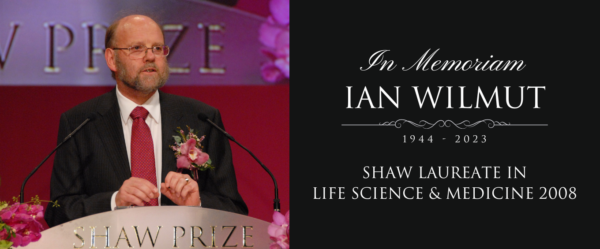
September 10, 2023 – Sir Ian Wilmut, Shaw Laureate in Life Science and Medicine 2008 and Professor Emeritus of the MRC Centre for Regenerative Medicine at the University of Edinburgh, passed away at the age of 79.
Sir Ian was the leader of a research group at the Roslin Institute near Edinburgh that used sheep as the model in order to understand the early physiology of the egg and how laboratory manipulations can improve our knowledge of the development from egg to birth. In 1995, Sir Ian and Professor Keith H S Campbell produced a pair of lambs called Megan and Morag from embryonic cells. They also performed nuclear transfer experiments in which nuclei from embryonic, foetal and adult cells of the sheep were transplanted into fertilized eggs derived from ewes.
Although the yield was low, they were successful in obtaining live newborn lambs from these transfers. One of the live-born lambs, Dolly, was derived from the transplantation of the nucleus of an adult mammary cell. Thus, Dolly was the first example of the reprogramming of the adult cell back to totipotency in mammal. They further created a sheep called Polly in which they showed that it was possible to incorporate a human gene into the donor’s DNA before cloning, thus indicating that it is possible to use animals to produce human proteins for the benefit of humankind. Since then, their work has been duplicated in many other animal species and has provided approaches to produce useful therapeutic products with cloned animals and to improve agricultural practices. Sir Ian, in particular, focused on developing therapies for degenerative diseases including ALS (Amyotrophic lateral sclerosis), also known as motor neurone disease.
Sir Ian and Professor Campbell shared the Shaw Prize in Life Science and Medicine 2008 with another Laureate, Professor Shinya Yamanaka, “for their recent pivotal innovations in reversing the process of cell differentiation in mammals, a phenomenon which advances our knowledge of developmental biology and holds great promise for the treatment of human diseases and improvements in agricultural practices.”
The passing of Sir Ian leaves a void in the scientific community, but his contributions will continue to inspire future generations of researchers in the field. His legacy will forever be remembered as a testament to the power of scientific exploration and its profound impact on society. The Shaw Prize Foundation extends its heartfelt condolences to Sir Ian’s beloved family, friends, and colleagues.
14 September, 2023
